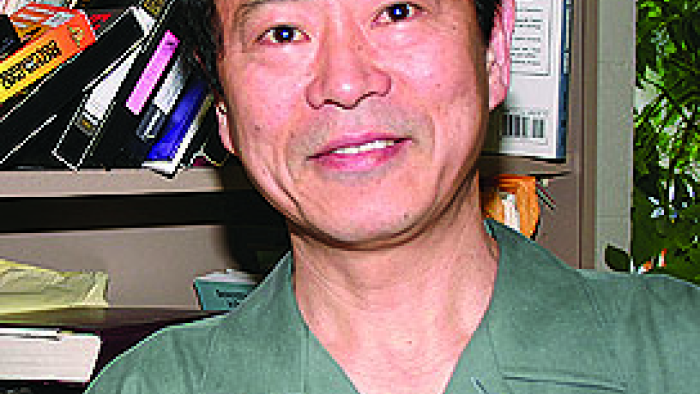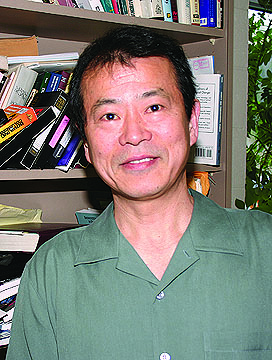
At a glance
 Dr. Choichiro Yatani, professor, Social and Behavioral Sciences Department at Alfred State College, recently attended the 20th anniversary meeting of the Oxford Round Table where he presented his paper, "With Us or Against Us: American Images of the Enemy."
Dr. Choichiro Yatani, professor, Social and Behavioral Sciences Department at Alfred State College, recently attended the 20th anniversary meeting of the Oxford Round Table where he presented his paper, "With Us or Against Us: American Images of the Enemy."

 Dr. Choichiro Yatani, professor, Social and Behavioral Sciences Department at Alfred State College, recently attended the 20th anniversary meeting of the Oxford Round Table where he presented his paper, "With Us or Against Us: American Images of the Enemy."
Dr. Choichiro Yatani, professor, Social and Behavioral Sciences Department at Alfred State College, recently attended the 20th anniversary meeting of the Oxford Round Table where he presented his paper, "With Us or Against Us: American Images of the Enemy."
At the opening dinner, Dr. Kurt Ballstadt, professor of philosophy and history at Oxford University and facilitator of the Oxford Round Table, noted that participants were selected and invited based on their publications, presentations at national and international conferences, and other references concerning the topic, "Civilization at Risk: Seeds of Strife."
Yatani notes, "It [the conference] was a very intense, but candid exchange about the issues over ‘war and peace' and ‘civil rights under the war against terror.' For me, it was a sort of magical five-day gathering where 26 scholars from 10 countries presented their work and argued from interdisciplinary perspectives while living in one of the Oxford University dormitories, eating three meals at a dining hall like the one in the Harry Potter movies(!), visiting pubs after dinner, and continuing the discussions even after midnight. There were psychologists, political scientists, linguists, sociologists, and those with law degrees. Nearly half of them spoke English with strong accents and unique intonations, although many of them were able to speak more than three languages!"
The abstract of Yatani's paper follows: "During the Cold War, over 350,000 foreigners were ‘blacklisted' in the United States Lookout System as ‘aliens undesirable and excludable for ideological grounds' to the United States. A testimony of the ‘blacklisted' Japanese psychology professor as one of them, this paper presents a brief review of America's enemies since WW II, Communist Russia, and rogue states and terrorists after ‘9/11,' in particular. My documents make suggestions to examine the causes and effects of the exaggerated enemy images of those countries and groups by pointing out three variables representing the unique dissonance of the American democracy abroad and at home. Americans' strong nationalism, surprising lack of knowledge over the world affairs, and feelings of powerlessness are discussed. America might need its enemies to define itself although such practices would bring further crises into world peace as best symbolized by President Bush's famous statement, ‘with us or against us.' The presentation addresses four of the seven subtopics on the 20th Anniversary Oxford Round Table: nuclear proliferation and rogue states, protection of human rights in an era of terrorism, religion and ethnic hostility, and social psychology of culture and race."
Additionally, Yatani says, "It was quite encouraging to talk with those social scientists who have a strong commitment to scholars' ‘social accountability' for world peace and justice."
The Oxford Round Table convened 20 years ago for the first time to consider major issues in contemporary educational policy in the United States, the United Kingdom, and other selected countries. The membership of this meeting was limited to ministers of education from several nations and a number of governors from the United States. The meeting was so successful that subsequent sessions were held. During the later half of the 1990s, the Round Table expanded to consider important public policy matters bearing on human rights, law, economics, public finance, and politics.
The Oxford Round Table, a not-for-profit organization, is a unique forum, not a conference in the conventional sense, but rather an opportunity for select leaders in both the public and private sectors, as well as scholars, to discuss government policy over a five-day period in a collegial, "think-tank" atmosphere in the ancient city of Oxford. Although an agenda dictates meeting times, the structure of the program allows for the discussions of participants to develop and flow in response to issues and concerns presented at each meeting.
Invitees to Round Tables are determined based on several criteria, among which are nominations by earlier attendees, courses that invitees teach, their presentations and writings, and their professional involvement in a relevant area of interest. An attempt is also made to diversify as to the type of institution, public or private, and to involve institutions representing different levels of education, i.e, schools, community colleges, four-year colleges, graduate and research universities.
Find out more about the Oxford Round Table, http://www.oxfordroundtable.com/.
